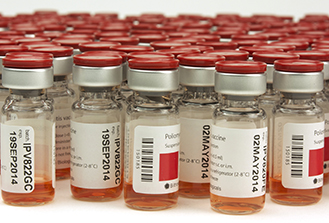
Bilthoven Biologicals restarts production of polio vaccines
In November 2022, a Bilthoven Biologicals employee became infected with the polio virus during his work. The company then ceased activities with active polio virus. An investigation into the cause and improvement actions were successfully carried out. On February 6, the company will restart production of polio vaccines.
Protection of people and the environment
Bilthoven Biologicals (BBio) has carefully examined its working methods. Procedures have been further tightened and the company has started producing polio vaccines again. Because the reduction of the polio disease has been very successful in recent years, the focus is increasingly on containment of the virus in production and laboratories. At the same time, a lot of vaccines still have to be made to eradicate the disease and BBio wants to provide that.
Cause
In November 2022, a very small amount of poliovirus was found in the sewage system. This has not posed any danger to the environment, because the Netherlands has a closed sewerage system and the virus is broken down in the water treatment plant. A BBio employee turned out to be infected with the polio virus during work. The employee has not become ill because he has been vaccinated. However, he was a carrier of the virus and could possibly pose a risk to people in the area who have not been vaccinated. The employee went into isolation until he no longer excreted a virus. All work with active polio virus was immediately halted, procedures were checked and tightened.
New regulations
In the late 1980s, the World Health Organization (WHO) launched a program to eradicate polio. The program has been so successful that there are only two countries where the virus is found in the wild. With this success, new regulations should ensure that the virus cannot escape from the production and testing of polio vaccines. BBio is preparing for the new regulations and has built a factory and laboratory that meet the new standards. The National Authority for Containment (NAC; part of the Health and Youth Inspectorate) will supervise the implementation of the regulations once they have been incorporated into law. In anticipation of that formal task, the NAC has been measuring wastewater for the presence of live poliovirus for four years now. This measures the smallest quantities that have entered the sewer. The origin of this is determined at DNA level in order to find out and solve the cause. At the same time, further spread is prevented by placing infected persons in isolation. This is a collaboration between BBio, the National Polio Laboratory of the RIVM and the local GGD. Deviations in vaccine production are thus recognized, isolated and resolved at an early stage.
About Bilthoven Biologicals
For more than 60 years, BBio and its legal predecessors have been making polio vaccines with which many residents of the Netherlands have been vaccinated at a young age as part of the National Immunization Programme. Polio no longer occurs in the Netherlands due to the high vaccination rate. Yet millions of vaccines still need to be produced to ensure that the disease is eradicated worldwide.
Bilthoven Biologicals was created after the privatization of the NVI. In 2012, the Cyrus Poonawalla Group took over this part of the NVI, creating a powerful combination of knowledge and facilities. With the purchase of BBio, there was an opportunity to significantly increase the production of polio vaccines, making a major contribution to the global eradication of polio.
| Share |








|






